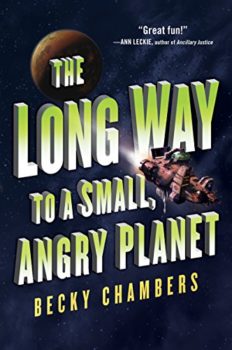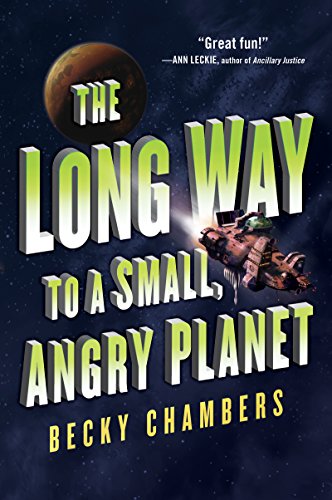
Space opera. The term conjures up visions of intergalactic battles, ugly alien monsters, and heroic human commanders besting all against impossible odds. Back in the 1930s, science fiction was dominated by such sophomoric fare, and the genre has reappeared periodically ever since. Notable latter-day examples include Lois McMaster Bujold’s long-running Vorkosigan Saga and John Scalzi’s Old Man’s War series. Both series have been bestsellers in recent years, and Bujold has won five Hugo Awards for hers.
In the early days of the genre, the typical space opera was characterized by one-dimensional characters, awkward dialogue, and lengthy scene-setting digressions. But today’s writers do a much better job. Now a young American author, Becky Chambers, has come onto the scene with the first two novels in a modern space opera series, with a third on the way later this year. The series debuted with The Long Way to a Small, Angry Planet, a delightful departure from all the bad habits exhibited in the genre’s infancy. (She was able to finish writing the book only by raising the necessary money from 83 generous souls on Kickstarter.) Chambers’ characters are beautifully complex, the dialogue often sings, and her detailed and fascinating future universe emerges seamlessly from the story.
The Long Way to a Small, Angry Planet (Wayfarers #1) by Becky Chambers (2015) 423 pages ★★★★★
Winner of the 2019 Hugo Award for Best Series
A modern space opera in a universe teeming with life
A 23-year-old woman is fleeing her life on Mars under the assumed name Rosemary Harper. To get as far as possible away from the people there who blame her for something terrible she had nothing to do with, she secures a job as a clerk on a ship that cruises through the galaxy “punching” wormholes into space. The Wayfarer is a second-class ship with a typical multispecies crew. It’s “the ugliest ship she’d ever seen.” Chambers notes, “Building wormholes was not a glamorous profession. The interspatial passageways that ran throughout the Galactic Commons were so ordinary as to be taken for granted.”
Captain Ashby Santoso; the “algaeist” who tends the fuel tanks and hates everybody; and the two techs, Kizzy and Jenks, are all human. The pilot, Sissix, is an Aandrisk. She resembles a lizard (but don’t ever call her that!). Ohan, the navigator, is a Sianat Pair who inhabit a single body but are referred to as “they” and “them.” Dr. Chef is a six-limbed Grum whose handfeet show great skill both in the medical lab and in the kitchen. And then there is Lovelace, known as Lovey, the AI who serves as the ship’s eyes and ears, its memory, and its internal communications. They’re all sapients in the terminology of the time.
A 21st century version of space opera
With this motley cast of characters, you might expect a lifeless and tedious adventure tale along the lines of a 1960s production of Star Trek. But no. This is a 21st-century version of space opera. Kizzy and Jenks (female and male) are best buddies and inseparable. However, Jenks is in love with Lovey, and the feeling is mutual. (Yes, Lovey is the artificial intelligence embedded in the ship.) We wonder about Rosemary, but not for long. She clearly has eyes for Sissix, the pilot. (They’re both female.) The captain is involved in a long-distance love affair with a silvery sapient named Pei who represents the most beautiful species in the galaxy. They’re male and female, the only traditional coupling in the story. Somehow, Chambers makes all these relationships believable. And, as Ann Leckie said about this book in a cover blurb, it’s “great fun.”
The greatest strength of this novel lies in character development. But the scene Chambers sets and the plot she spins out are both outstanding. I can’t wait to read the two sequels. This is modern space opera with legs.
For related reading
In addition to the books in Chambers’s Wayfarers series, I’ve also reviewed an excellent hard sci-fi novel she wrote: To Be Taught, If Fortunate—An excellent hard science fiction novella from Becky Chambers and the first novel in the Monk and Robot series, A Psalm for the Well-Built (The intriguing start to a new Becky Chambers series). And I’ve included Becky Chambers on my list of Six new science fiction authors worth reading now.
You’ll find this book on The 40 best books of the decade from 2010-19 as well as on my list of The decade’s top 10 historical novels, mysteries & thrillers, and science fiction.
For more good reading, check out:
- These novels won both Hugo and Nebula Awards
- The ultimate guide to the all-time best science fiction novels
- 10 top science fiction novels
- The top 10 dystopian novels
- Good books about space travel
- Ten new science fiction authors worth reading now
And you can always find my most popular reviews, and the most recent ones, on the Home Page.



























